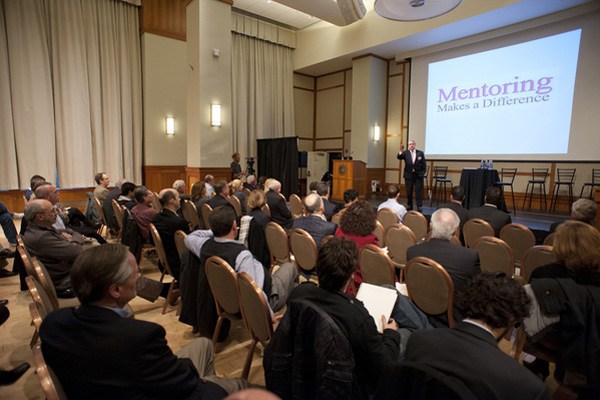Advice, tips for budding entrepreneurs

Throughout Global Entrepreneurship Week, speakers offered advice and insight on topics ranging from mentorship and early-stage funding to the do’s and don’ts of starting a business. Here’s a roundup:
Richard Hawkes, DMSB’15, currently working on co-op at Guided Surgery Solutions:
On getting the most out of co-op at a startup: “If you show hustle, if you show the effort, you’ll get more responsibility.”
Chris Wolfel, DMSB’13, former CEO of IDEA, current sales consultant at YesWare:
Advice for interviewing for a co-op position or job after graduation: “Be realistic and be yourself. People might get caught up in being ‘this person’ to get this job. If you craft yourself and present yourself as something that you aren’t … it’s not going to work out in the long run.”
“One thing to remember is that you’re looking for a fit both ways. You’re not just trying to sell yourself to that company.”
Joey Lafyatis, president of the student-run Greenline Records:
On how to manage the transition of leadership in your student organizations: “You have to create a system that will naturally allow people to rise to the top.”
Max Kaye, DMSB’14, CEO of Northeastern’s student-run venture accelerator IDEA:
“The work that gets done in IDEA is absolutely transferable to the real world. … You’re developing a skill set that’s equally applicable to industry. It’s not just something that’s relevant for student on campus. It’s the same type of work, whether it’s investments, communications, or social media.”
Casey Hogan, president of the Northeastern Entrepreneurs Club:
On her role as the leader of a student group: “It’s been a really unique experience because I learned through co-op that I am by nature an operator. If I see something broken, I want to fix it—I want to change it now. When you’re in a situation in these groups when you’re working with students who are doing this because they love it, you can’t say you’re not doing a good job, you need to find something else. It’s leading through motivating. It’s a learning experience for them too.”
Nicole Ledoux, CEO and co-founder of 88 Acres, a healthy snack food startup:
On the value of using a Kickstarter campaign: “There’s a ton of work that goes into a successful crowdfunding campaign,” ranging from connecting with bloggers and media members to throwing a launch party. “We needed to think about ways to generate a ‘thunderclap’ effect where we’d burst right out of the gates.”
Third-year law student Alan Guichard, who is among a group of law students developing a student-run intellectual property clinic:
On how to respond to potential skepticism of student-run organizations’ ability to provide the highest quality services: “If expectations are low, it’s a good opportunity to ‘wow’ people.”
Bradley Waugh, president and CEO of Tunstall Americas:
On the impact of mentors have on entrepreneurs: “The smartest move in business is having a mentor.”
Greg Dalle-Molle, DMSB’05, director of business development for Smartleaf, a financial technology company located in Cambridge, Mass.:
His three themes for being an effective mentor to entrepreneurs: the value you bring as an outsider, solving problems together, and guiding them through the accelerator and making sure they have access to the resources they need.
Tom Olsen, E’11, president and founder of Zephyr Energy Corporation:
On the impact his mentors have had, including serial entrepreneur Bret Siarkowski, E’87: “What mentors provide is a fresh perspective, one that can see beyond the challenges of the moment and provide words of encouragement. We speak every week, and when I get off the phone, I feel more focused and motivated to get to the next milestone.”
Jeff McCarthy. DMSB ’77, partner at North Bridge Venture Partners:
On the importance of the team when investing in a venture: “Markets evolve at different rates. With technology, sometimes you have trouble with it or it morphs, or a new entrant has something that is better, faster, cheaper. But good teams find a way to react to that and still prosper.”
Nicole Strata, founder and managing director of Seed Boston Capital:
“One thing we absolutely don’t love to hear is ‘No one else is doing this.’ My immediate response is, ‘How do you know?’ there could be a guy sitting in Arizona sitting in his basement saying no one else is doing this because he doesn’t know you. So presume everyone else is doing it. The question is how are you doing to it better, faster, cheaper, and become Facebook.”
Speaking about what qualities are important in an entrepreneur running an early-stage venture: “In the earlier stage seed, when you’re dealing with folks who are just coming out of school or don’t have a track record or experience, I think the default is not wanting to show your cards on what you don’t know. The folks that we find to be superstars are the ones who don’t care if the universe knows what they don’t know. And even as we look at serial entrepreneurs, one of the characteristics that I love about a lot of them who I’ve worked with who’ve had huge successes is the ability to say, ‘I don’t know. Can you help me? Will you help me? This is an area I don’t know.’”
Ray Milano, L’98, who oversees economic development in Massachusetts as an assistant district director at the U.S. Small Business Administration:
On advice for young entrepreneurs: “The lender wants to make sure that passion is there. Someone who will say, ‘I’m going to make this no matter what. Whether you lend to me or not, I’m going to make this a success, and here’s why.’”





